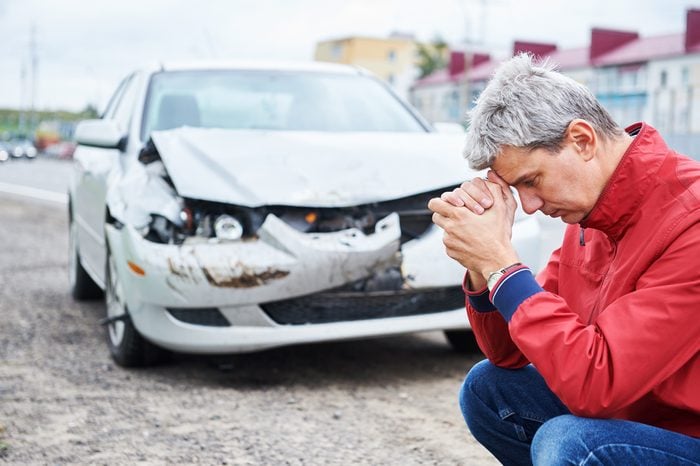
Remain as close as you safely can to the scene
With over 6 million motor vehicle accidents each year in the United States, it’s a near certainty you’ll be involved in one eventually, but what you do in the first ten minutes after can change how that accident impacts your life, according to Randolph Rice, a Maryland personal injury lawyer. First on the list of what to do after a car accident is remain at the scene of the accident. If you leave the scene, you could be charged with “hit and run,” which carries jail time and fines.
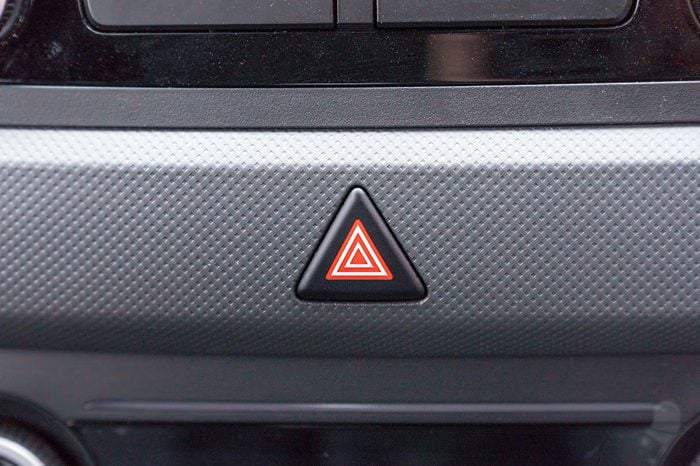
Activate hazard lights
Next on the list of what to do after a car accident is to draw attention to the accident by turning on your hazard lights, Rice advises. This will help warn other drivers they need to slow down as they approach. “You don’t want your accident to lead to another accident,” Rice tells Reader’s Digest. If you have a flare, this is the time to use it. These are the 20 car accessories that will change the way you drive.
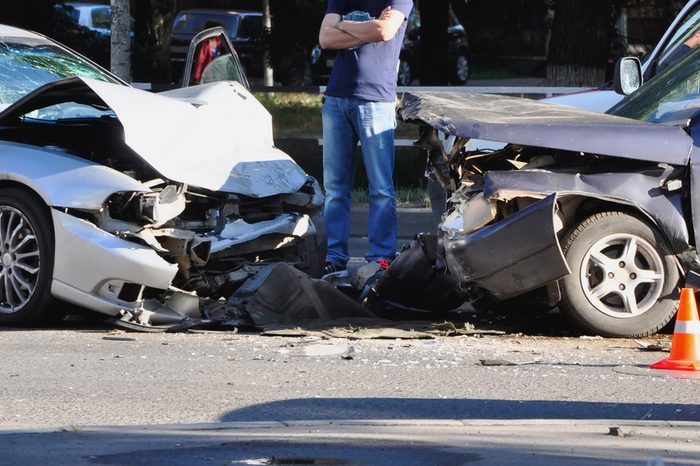
Avoid standing on the road
High on the list of what not to do after a car accident is standing anywhere on the road. Rice urges everyone to consider how dangerous it is to stand on a street where drivers aren’t expecting pedestrians to be. And please take note of these safe driving tips for scary driving situations.
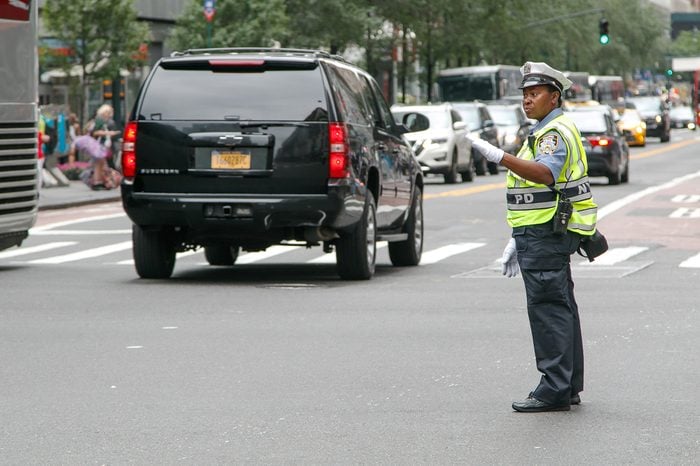
Leave traffic direction to the cops
Also in the interest of avoiding another accident, please don’t even think about trying to direct traffic, Rice advises. It’s not safe, and you don’t have the legal right to be doing so.
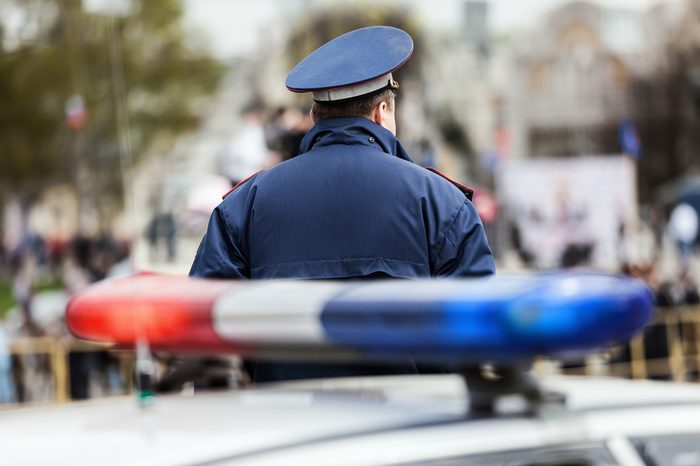
Call the police
When it comes to figuring out what to do after a car accident, in those first stressful ten minutes, there’s no better resource than the police, Rice explains to Reader’s Digest. Whereas this might be your first accident, it’s not the first time a police officer has attended one. That puts them in a great position to guide you. Plus, the police can complete an accident report (which can help when it’s time to file an insurance claim), ensure the necessary information is exchanged among the parties involved, and arrange a tow truck and call an ambulance as needed. Don’t miss these 17 secrets traffic cops won’t tell you.
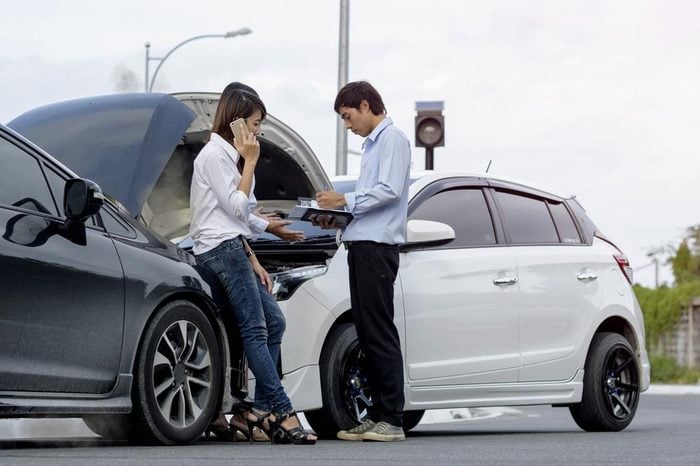
Exchange insurance and other important information
While waiting for the police to arrive, go ahead and exchange insurance information with any other people involved in the accident. That includes names, addresses, and phone numbers. This doesn’t mean you will file a claim, and it doesn’t mean that you have to file a claim. But it enables you to do so. And it leaves one less thing for the police to oversee when they arrive. Here are 45 things police officers want you to know.
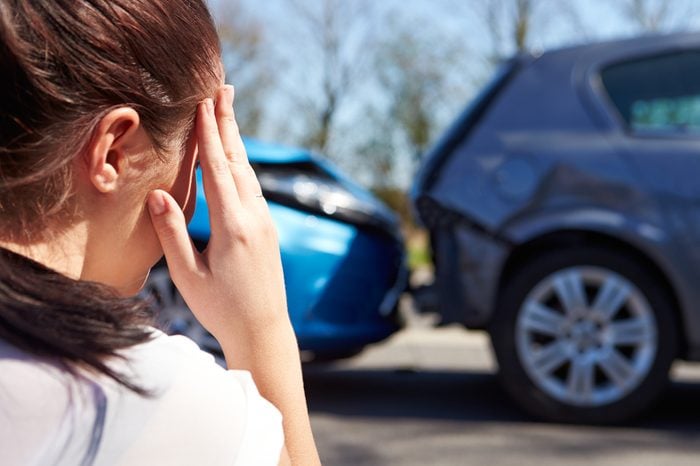
Keep your mouth shut
The ten minutes and even hours after the accident can be stressful. Rice says of car accidents, “drivers may have an initial impression of how the accident happened. But then the stress subsides and they start to relive the crash. Sometimes the initial impressions of the accident are not what really happened. Don’t admit fault at the scene, this is something that can be determined at a later date by your lawyer and the insurance companies.” By admitting fault, you may make yourself financially responsible for the accident, whether you actually are or aren’t.
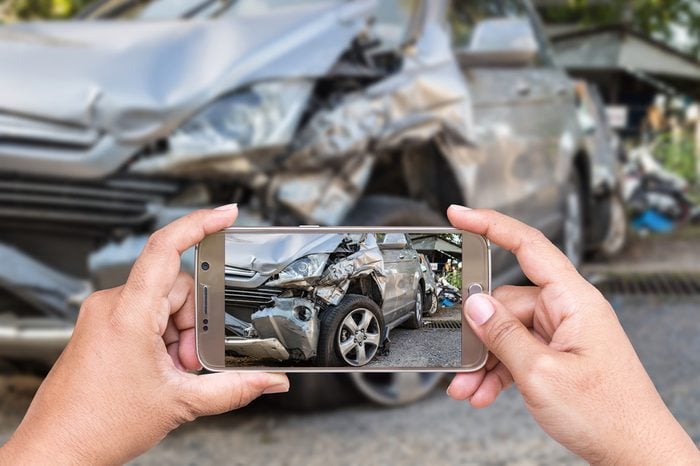
Take photographs
“A picture is worth a thousand words,” Rice explains, so take photos of the vehicles and the scene. Err on the side of taking too many rather than too few. “When we ask our clients how the accident happened, they often have trouble depicting the scene. But, if they bring pictures of the scene and vehicles, it’s much easier to understand the crash and how it happened.” Keep these 14 things in your car and you’ll be twice as productive.
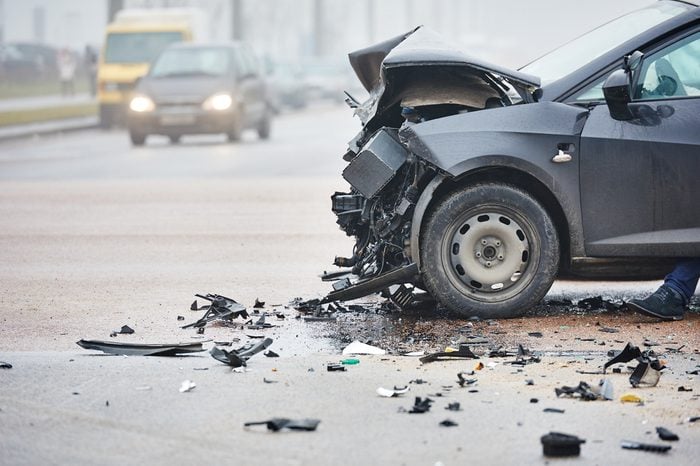
Take note of the time and weather
“The time, date, and weather are important facts in any car accident scenario,” Rice explains. “The weather conditions can be relevant to who was at fault, or how much each driver was at fault.” And when you’re trying to remember what to do after a car accident, writing down these simple facts may help you to organize your thoughts and your actions.
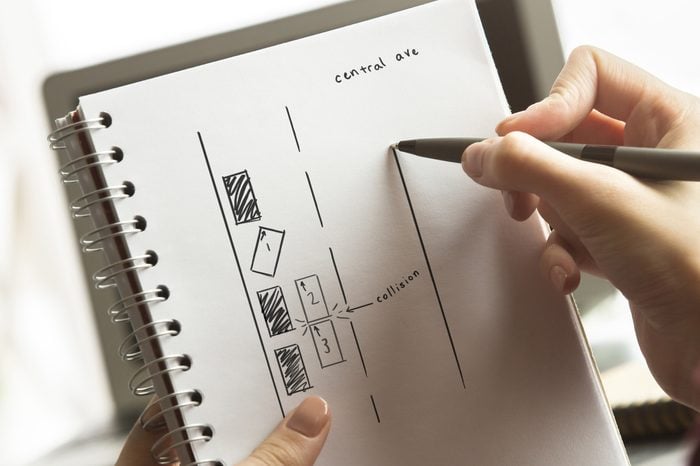
Draw a diagram
Don’t leave the scene without drawing yourself a bird’s-eye view of the accident, Rice advises. It can be very helpful in figuring out (later on) who was at fault and what the precise nature of the damages are. “Include all of the street names, cross streets, traffic lights and where each vehicle was traveling before and after the impact. This will help you remember the accident if you have to go to court at a later date or recount the facts to your insurance company.”
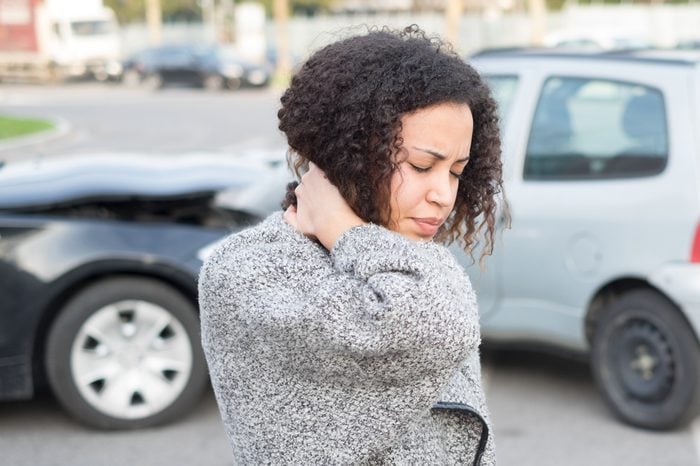
Think twice before saying, “I’m not injured”
You may not feel injured at the scene, but just like you shouldn’t admit fault, you shouldn’t say you’re not injured. You might actually be injured but not yet realize it, Rice points out.
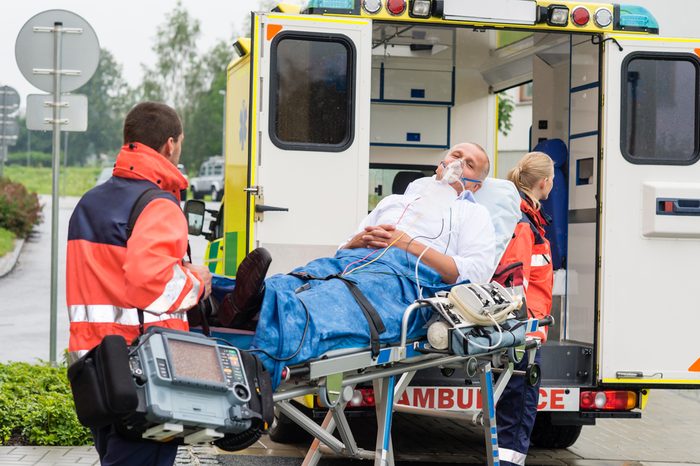
Consider getting medical attention
Even if you truly believe you’re not injured, you should allow yourself to be checked out by paramedics after a car accident if they were called to the scene, Rice adds. If paramedics suggest you go to the hospital, then you absolutely should go, Rice advises, based on what he’s seen in his experience. On the other hand, emergency room physician, Troy Madsen, M.D. believes paramedics tend to err on the side of caution, suggesting a visit to the ER even if they aren’t certain it’s necessary. So, what do you do if you don’t know what to do? First, Dr. Madsen points out that sometimes injuries won’t be immediately apparent due to the effects of shock/adrenaline. So if you do feel pain, particularly in the head, neck, or abdomen, it’s certainly worth a trip to the ER. It’s also worth a trip to the ER if you’re not in pain, but your car suggests perhaps you should be (cracked windshield could suggest a head injury, for example). Otherwise, it’s not unreasonable to wait a day to see how you’re feeling, bearing in mind that some injuries become apparent in the hours and days following an accident.
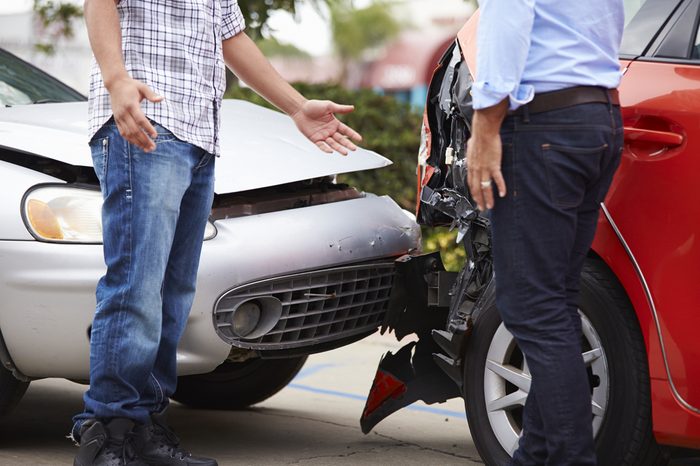
Be careful who you talk to at the scene
It’s horrible but true: some people are professional accident stalkers, arriving at accident scenes within those first ten minutes to try to get the people involved to be seen by a particular doctor or to sign on with a particular attorney. It’s illegal, Rice points out, at least in some states, but it still happens. Don’t engage with these “runners,” as Rice calls them.
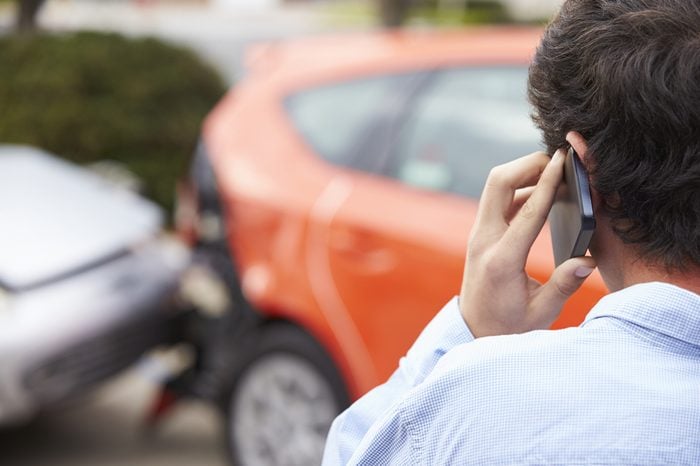
Call your insurance company
You may not realize that high on the list of what to do after a car accident is getting in touch with your insurance company. Without making a formal claim, you’ll still want to confirm your coverage, and it could be helpful if the other driver(s) involved are willing to talk to your insurance company. “If you were not at fault for the accident, you want to have the at fault or liable driver on the record that they caused the accident.” These are the most dangerous roads in the world.
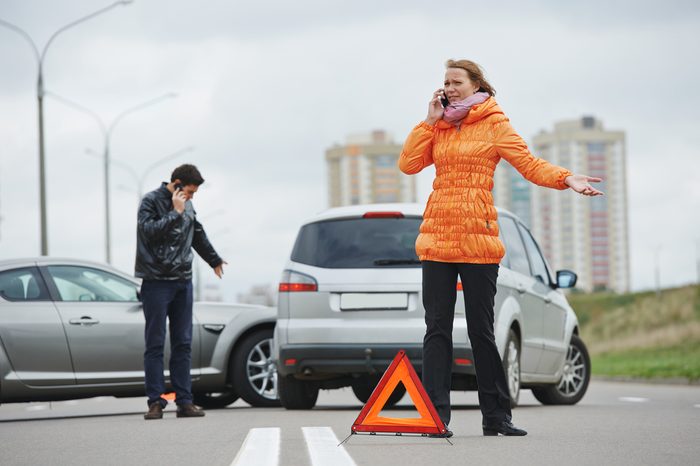
BUT refuse to talk to anyone else’s insurance company, yourself
Many drivers who cause an accident later deny fault. By not talking to anyone else’s insurance company, you protect yourself from saying anything incriminating that might lead to a conclusion the accident was your fault. Leave it to your car accident attorney to contact the other drivers’ insurance company. “Anything you say to the other driver’s insurance adjuster can be used against you during the claim process.” Next, brush up on these 11 driving etiquette rules you probably don’t remember since high school.
